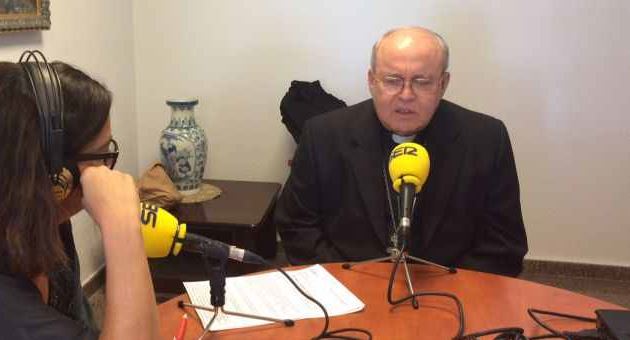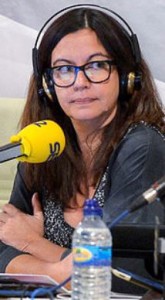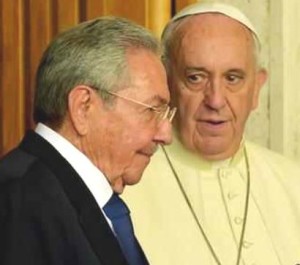
Cardinal Ortega challenges critics to prove their assertions
Cardinal Jaime Ortega, Archbishop of Havana, has voiced surprise at the criticism he has received from anti-Castro groups outside and inside Cuba for a statement he made June 5 on Spanish radio.
During an interview on Madrid’s SER radio network, on the program “Hora 25” hosted by Ángels Barceló (photo at top with the cardinal), the following exchange took place, as transcribed and translated by Progreso Weekly. The topic was Pope Francis’ role in the U.S.-Cuba rapprochement and his forthcoming visit to Cuba:

BARCELÓ: Lastly, Cardinal, in December, Pope Francis will visit Cuba. What can be expected from this visit? Around the visit, could there be some gestures — what do you expect from it?
ORTEGA: The visit is part of this whole process, I believe. Now, the Pope has taken an interest in going to Cuba, associating himself a bit to this intervention that was mentioned by both presidents in their simultaneous speeches of Dec. 17 to Cuba and the United States. […]
So, this will be very significant, not only for Cuba but also for Latin America. […] Any internal gestures that might occur, yes, internal gestures could occur. When Pope Benedict went [to Cuba in March 2012], there was a pardon for common prisoners, because today in Cuba there no longer remain any political prisoners —
BARCELÓ (interrupting): No political prisoners remain?
ORTEGA: No. Then, of course, there may be a gesture of that kind, there could be some of that. That is always done with great discretion. […]
[To hear the full 30-minute interview, in Spanish, click here.]
Last Tuesday (June 16), a group of anti-Castro activists in Miami staged a press conference to denounce what they called the prelate’s “irresponsible” statement. In Havana, the unofficial Cuban Commission on Human Rights said that 71 citizens are currently behind bars “for political reasons or through procedures that were politically conditioned.”
On Saturday (June 20), Cardinal Ortega said that he has not seen any list of political dissidents being held in Cuban jails.

“We are receiving hundreds of letters from people expecting a general pardon” during Pope Francis’ visit, he said, “but none deals with political crimes.” However, many people ask the Catholic Church to intercede for inmates jailed “for economic crimes,” he said.
“Let them inform us about that list of political prisoners,” the cardinal insisted, alluding to the Human Rights Commission. “Let them deliver it to us.”
Ortega lamented the “political connotation” given to Pope Francis’ visit to the island, which, in his opinion, could create “a heavy ambience” and lead to “violent” responses.
Although many of the faithful are pleased, “there are others who feel bad about the Pope’s visit to Cuba and believe that it has political connotations,” he said. This year, Pope Francis gave an audience to President Raúl Castro; last year, he gave one to President Obama.
“An environment is created that could go ‘in crescendo’ from now until the Pope arrives,” an effort “to create a heavy ambience inside and outside [Cuba].”
However, “these things are always overcome,” Ortega added.

